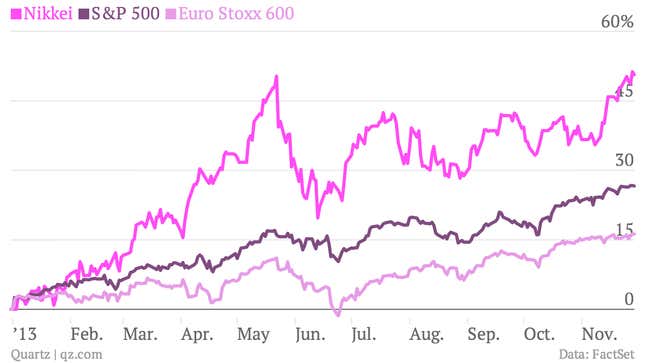It’s been a tremendous year for stock markets in large, developed economies.
In the US, the S&P is up about 27%, the Nasdaq is up 34.5%. Japan did even better. The Nikkei is up 51% year-to-date. Even in economically plagued Europe, the equities markets had a terrific run, with the Euro Stoxx 600 up nearly 16%, through the start of December. After such broad-based increases, might it be time to take some of your winnings off the table?

No, say Wall Street analysts, who traditionally take some time late in the year to publish their outlooks for where they think the market’s headed. And after weighing up the options, it seems like most everybody still prefers stocks to other asset classes such as commodities, corporate bonds and government debt. Here’s a smattering of what they’re saying.
We continue to recommend overweight allocations to global equities relative to other asset classes.
-Citi Global Asset Allocation
Our strategic allocation remains equities over bonds, and corporate bonds over government bonds. The global expansion will remain intact per our Economics team’s baseline, and equities and corporate bonds are not overvalued, either outright or relative to government bonds.
-Morgan Stanley Research Global Strategy
Our base case for 2014 is further double-digit returns in equities, with fixed income largely experiencing a repeat of the subdued returns seen in 2013.
-Credit Suisse Global Fixed Income & Economics Research
Over the years, our strategy has made good use of both relative value and momentum. This keeps us quite long equities, where strong price momentum has in our mind only made stocks less cheap but not yet expensive against their main alternatives.
-JP Morgan Asset Allocation
Of course, the full analyses accompanying these projections are replete with conditionals, qualifications and all sorts of other hedges. And no wonder: Investors in the US have squeezed a lot out of S&P 500 already. At roughly 15 times earnings, the average forward price-to-earnings ratio for stocks in the S&P, a gauge of priciness, suggests that equities are verging on expensive, or at least no longer cheap. And retail investors are piling into the stock market, which is usually a good indication that this rally is getting a bit long in the tooth.
Still, the tooth can get longer. And if it does, sitting on the sidelines of an ongoing rally would be represent something of a career risk for Wall Street market analysts. If they’re wrong on stocks in 2014, at least most of them will be wrong together, which is far safer for them—even if not for investors.